QuidelOrtho Global Health Scholar turns dreams into reality
The flexibility Stefanie Boyles learned growing up in a military family is serving her well as she juggles raising a family and pursuing a doctoral degree.
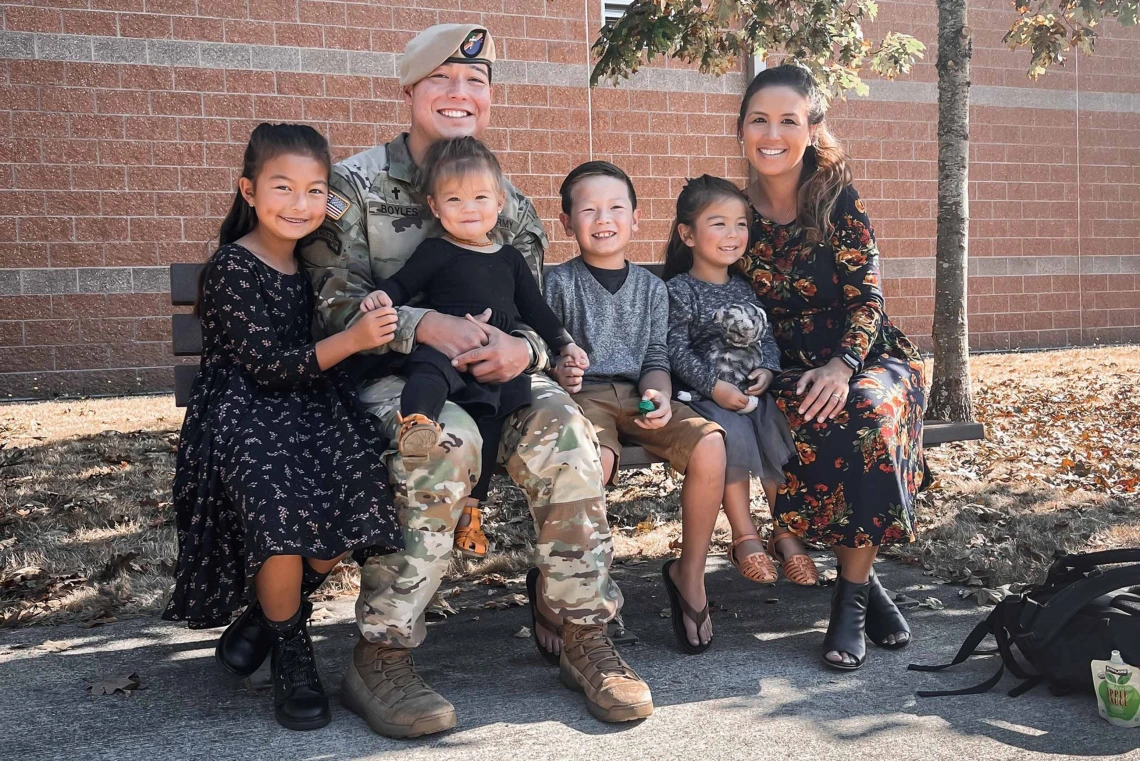
Stefanie Boyles (right) wears many hats: wife, mother, nurse, and now doctoral student at the University of Arizona College of Nursing.
The constantly shifting demands of parenthood are nothing new to Stefanie Boyles, RN, a mother of four children under the age of 10. As a registered nurse, she also is used to working in a profession that can pull someone in different directions at a moment’s notice.
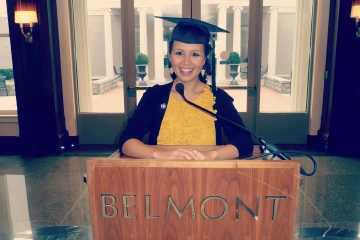
Stefanie Boyles, RN, earned a Bachelor of Science in Nursing through an accelerated undergraduate program at Belmont University.
Those experiences and more prepared Boyles well as she works to achieve her latest goal: earning a Doctor of Philosophy degree at the University of Arizona College of Nursing.
“I knew I wanted to serve others as a health care professional,” said Boyles, who is one of five UArizona Health Sciences students to receive a QuidelOrtho Global Health Scholarship that pays part of her tuition and fees. “As I read more about the role of nurses, I knew nursing was for me.”
From pre-med to nursing
Born in Seoul, South Korea, Boyles was exposed to various cultures and surroundings as her family moved whenever her military father was transferred to a new Army base. Among the places she called home are Washington, D.C., and Memphis, Tennessee, where she graduated high school as valedictorian of her class. Her next step took her to Baltimore, Maryland, where she enrolled at Johns Hopkins University as a pre-medical student.
“I realized midway through my program that the profession of nursing more closely aligned with my interests,” Boyles said. “I was drawn to the versatility of the discipline, and I knew I wanted to be in a role that allowed me more flexibility to establish rapport with my patients and their families.”
She earned a Bachelor of Arts in Public Health Studies at Johns Hopkins, then served as an AmeriCorps Volunteer in Service to America member in Anchorage, Alaska. Soon after, she completed the Accelerated Bachelor of Science in Nursing program at Belmont University and started her first nursing job at Vanderbilt University Medical Center.
Intrigued by the mother-baby bond
In 2020, when the COVID-19 pandemic caused many to think and live smaller lives, Boyles did the opposite.
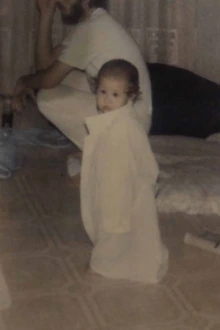
Boyles, pictured as a toddler in South Korea, had dreams of working in the health care field from an early age.
“I was pregnant with my fourth child, my husband was set to deploy overseas, and I was not in a position to work outside of the home; however, I watched the heroic things nurses were doing, and I felt very proud and inspired by those working on the frontlines during that hard time,” Boyles said. “It made me pause and think about what I could do to best steward the profession forward.”
That’s when she began to bring her higher education dreams into focus.
“Early in my nursing career, I knew I wanted to teach nursing students one day. I have always profoundly valued educators,” said Boyles, who also held a strong desire to contribute to the science of nursing through research.
Boyles dug through the grants listed in the NIH RePORTER to get a pulse on current research and was intrigued by the mother-infant bonding research being done by Aleeca Bell, PhD, CNM, associate professor at the UArizona College of Nursing.
Bell’s research aims to improve the health and well-being of mothers and babies by promoting physiologic birth, a positive birth experience and healthy mother-baby attachment/interaction. She is currently using a grant from the National Institute of Nursing Research, a division of the National Institutes of Health, to conduct a clinical trial to promote mother-infant synchrony in mothers with a history of childhood adversity. Synchrony, when the actions of one affect the actions of the other in a coordinated manner that is mutually rewarding, promotes bonding and infant development.
“Her study put language to my interests, so I reached out to her. I did not know anything about the University of Arizona, but I am grateful she spoke with me and encouraged me to apply,” Boyles said.
Bell says Boyles is an ideal student to guide along her path.
“Stefanie is a wonderful student to work with,” Bell said. “She has a rich life history and background that stirs her research interests. She puts 100% effort into her schoolwork, and she is open to learning, so I have no doubt she will excel as an early-career researcher.”
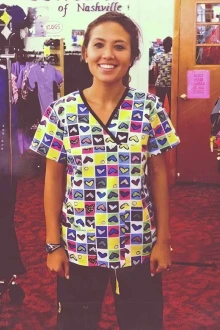
Boyles’ first nursing job was at Vanderbilt University Medical Center in Tennessee.
Boyles is assisting with Bell’s Mothers and Babies Project, which is testing a low-cost, early-life, multisensory behavioral intervention to improve synchrony. Study participants are taught an infant massage technique that is easy to learn and apply to their infant. The research team is also examining whether the massage intervention improves epigenetic regulation of the oxytocin system, which facilitates social interactions such as bonding, empathy and positive affect, which is particularly helpful for those who have experienced early-life adversity.
“I am also interested in people’s appraisal patterns,” Boyles said. “I am currently looking into the concept of childhood adversity appraisal. I want to explore the dynamic continuum between exposure to childhood adversity, the evolution of cognitive processes that shape one’s perception and behavioral responses, and the impact on one’s health. I am curious to see if appraisal patterns correlate with particular health outcomes and whether distinct appraisal profiles guide individuals toward paths of resilience or vulnerability. I believe this will allow us to employ more effective interventions to promote health and well-being in vulnerable populations.”
A unique program makes it possible
The College of Nursing’s Doctor of Philosophy in Nursing curriculum is offered almost completely online, giving Boyles the flexibility to complete her coursework and research on her own time, from any location.
“I am grateful for the PhD program at the University of Arizona College of Nursing,” said Boyles, who currently lives in Fort Campbell, Kentucky, and plans to move to Fort Leavenworth, Kansas, this summer. “The program’s asynchronous design allows me to continue my education now rather than later. I have been impressed and inspired by the nursing faculty. They do an excellent job of making the students feel connected. Our cohort is also very close. We talk every single day. We genuinely feel like we are going through this program together.”
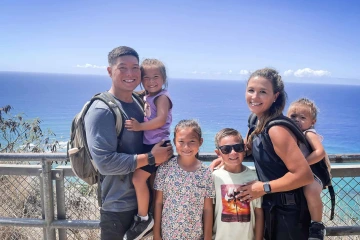
After earning her doctorate, Boyles plans to complete a postdoctoral fellowship and then apply to a Tier 1 research institution to teach, serve and conduct research.
“I now fully appreciate the indispensable role of nurse faculty,” Boyles said. “The nursing shortage is widely discussed, but something missing from that conversation is the cyclical nature of the shortage. Without adequate nursing faculty, enrollment in nursing programs will always be limited. We need nursing professors.”
Boyles said mentors have been vital in helping her toward her goals, and she is eager to pay forward the help she received.
“I have had so many teachers make a deep impression on my life,” Boyles said. “I highly respect those who inspire and equip students, and I hope to do the same one day. And, of course, I hope to generate new nursing knowledge that can advance nursing science and have a tangible impact on a person or community’s quality of care, well-being and life.”
Experts
Stefanie Boyles, RN
Graduate student, UArizona College of Nursing
Aleeca Bell, PhD, RN, CNM
Associate professor, UArizona College of Nursing
Contact
Phil Villarreal
UArizona Health Sciences Office of Communications
520-403-1986, pvillarreal@arizona.edu

